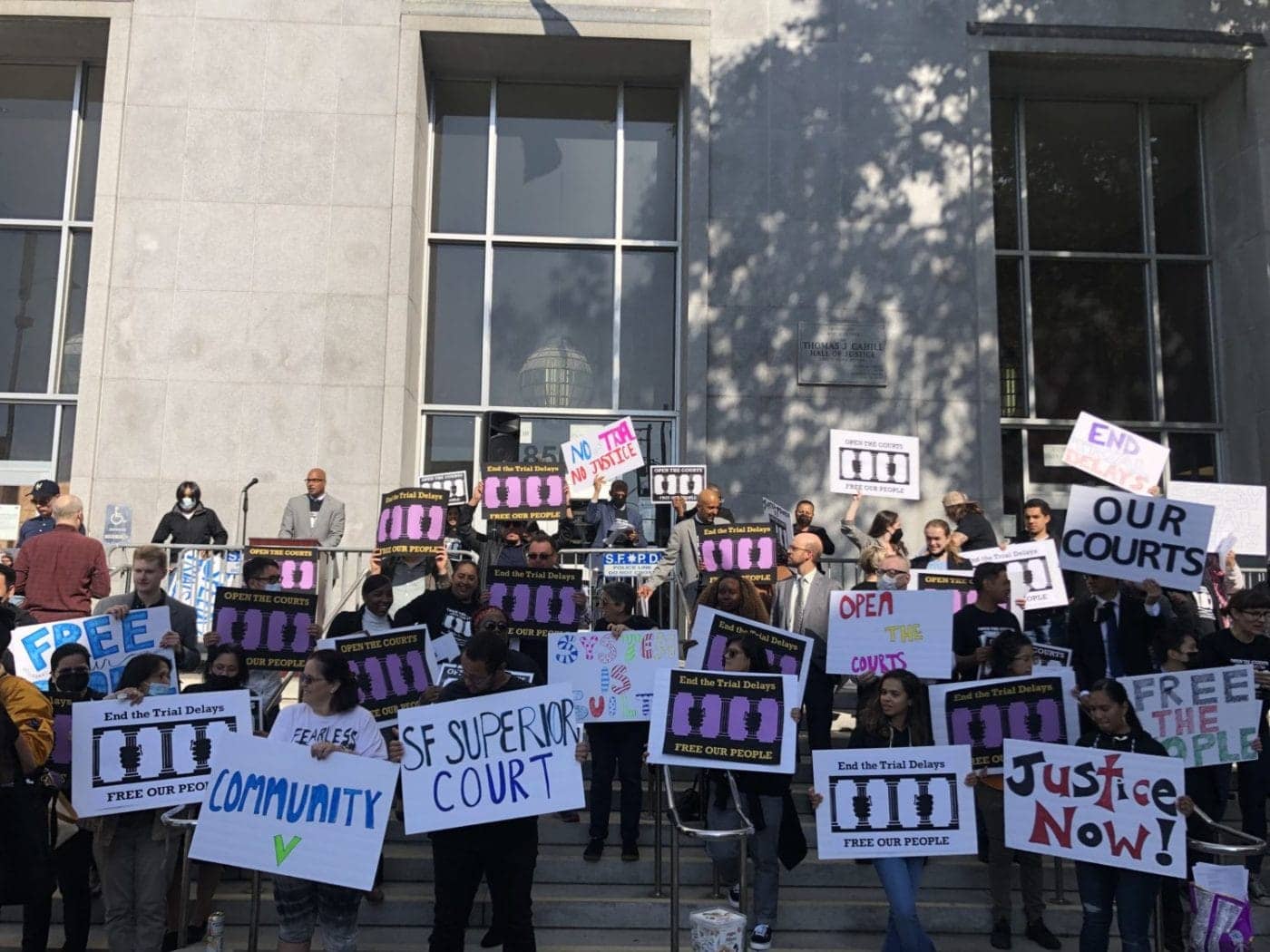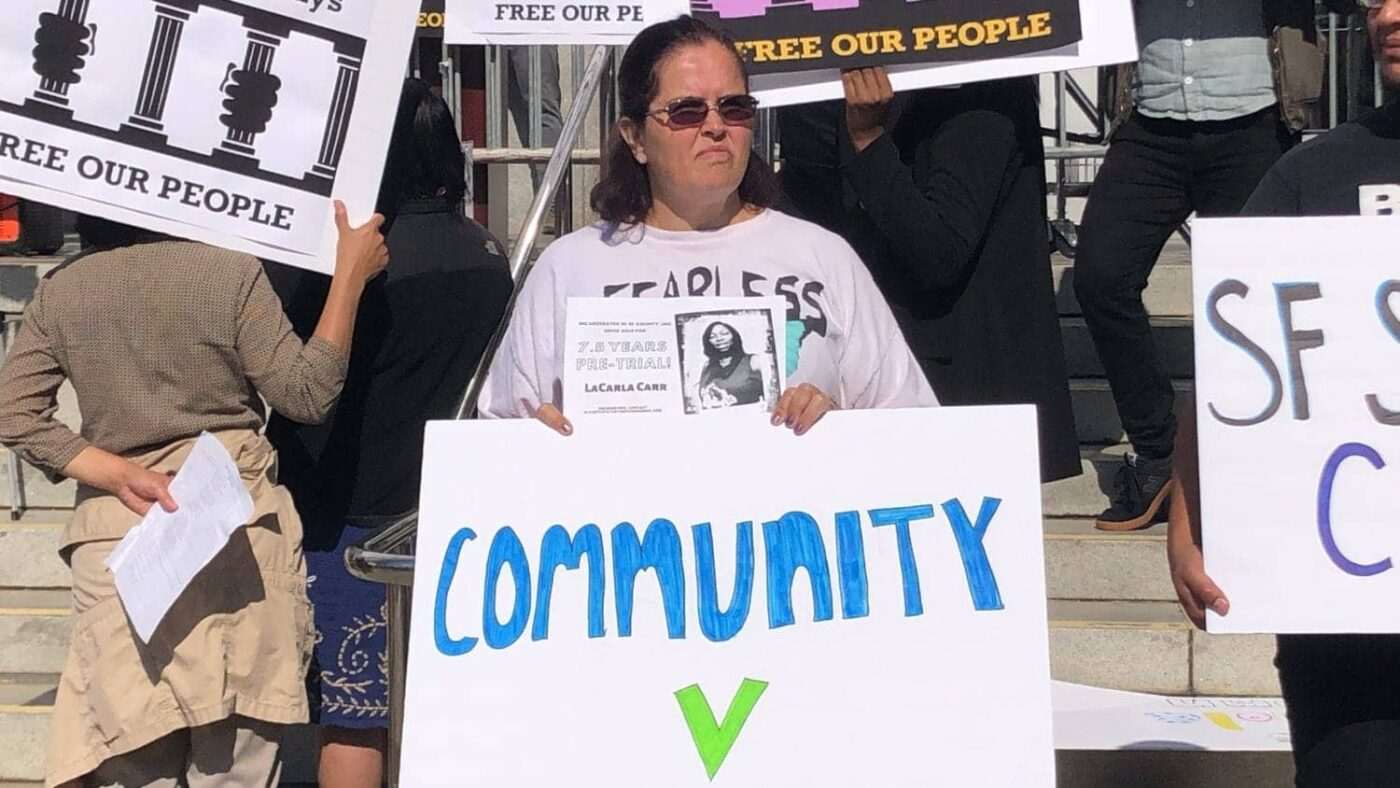
by Sophia Chupein
While most of San Francisco’s administrative commotion has returned since the onset of the pandemic, the San Francisco County Superior Court continues to violate the constitutional rights of over 550 people due to misaligned priorities and a lack of urgency. On Sept. 16, staggered along the steps of 850 Bryant Street, community members and leaders held a press rally in the form of a mock trial to call attention to the alarming criminal trial backlog in this city.
According to the U.S. Constitution, the Sixth Amendment guarantees an individual the right to “a speedy and public trial,” which is within 60 days on felony charges or 30 days for misdemeanors in California. Over 550 San Franciscans have been waiting much longer than this for their day in court.
Moreover, over 150 of these people are languishing indefinitely in jail. If you add up all the extra days that these people have been in jail past their statutory deadline, it totals out to 15,333 days. That’s 42 years of wrongful incarceration.
San Francisco’s trial backlog stands out
The courts started closing because of the Covid-19 pandemic, but after two and a half years and an overall return to bureaucratic normalcy, the indifference of the court continues to ruin the lives of people who have yet to be proven guilty. Mano Raju, elected San Francisco public defender, sued San Francisco Superior Court last year on behalf of the almost 400 people suffering in jail after being denied a speedy trial.
Raju made it clear that San Francisco’s backlog problem is far worse than that of surrounding counties: “Counties all over the state, including Alameda, San Mateo, Contra Costa, have not just opened but have used their courtrooms and available spaces to ensure that their residents whose freedom is at stake are given their day in court.” Of course, the San Francisco Superior Court continues to hold jury trials in non-urgent civil cases for money damages.
Unjust jailing is upending people’s lives and jeopardizing their health
Mayra Borg was the first to the podium perched in front of the San Francisco Superior Court building. Her daughter, Sarina Borg, has been locked behind bars for two years awaiting her trial. After Mayra’s daughter was jailed, Sarina’s daughter underwent a mental health crisis, ran away from home and wasn’t found until two years later.
While Mayra is working tirelessly to become her granddaughter’s foster parent, Sarina has developed a serious medical condition while in jail. Powering through her sobs, Mayra tells the crowd that after being repeatedly misdiagnosed, Sarina’s condition continues to spread throughout her body.
Although doctors at San Francisco General Hospital have prescribed her medication, it often takes weeks for Sarina to receive it. The jail staff sometimes completely fails to give Sarina her medication at all.
Stephanie Irving mirrored Mayra’s concerns in her own testimony on behalf of her diabetic partner Vincent Campbell, who has been awaiting his trial for over five months. Vincent was leading a perfectly healthy life before jail, taking care of his health and navigating the pandemic as an immunocompromised person.

After being locked up without an end date in sight, his health rapidly declined due to the inability to control his diet and he caught Covid. According to Stephanie, the jail staff were not mandated to take Covid tests. “I was scared he was going to die in there,” she said. “This time was supposed to be our time together, he should be with me, not still in that place.”
The testimonies kept coming, echoing up and down Bryant Street. Stephen Kloster spent over 400 days in jail waiting for court day, and when his trial finally came, he was acquitted of all felony charges.
Over the course of his imprisonment, he went to court four times, enraged everytime the judge delayed his trial. It only took the jury a day and a half to reach a decision. While he was locked in jail, his 87-year-old mother was left without her sole caretaker.
Other speakers took to the podium to speak truth to power as well. Community leader William Palmer, who was incarcerated for over 31 years, spoke directly to the acts of District Attorney Brooke Jenkins. Jenkins recently reintroduced the option to charge 16- and 17-year-olds as adults.
“Instead of holding trials to release our people, you are now trying to implement policy to get more, putting our children 17 and under in adult prisons and jails? Spend your time doing your job instead of locking up our children.”
District supervisors reveal the conflict behind closed doors
Hillary Ronen, District 9 supervisor, told the crowd what the issue looked like behind closed doors, explaining what happened when she put the chief judge of the superior court and the sheriff in the same room to find a solution to the trial backlog.
“When it comes to making sure the rich and the powerful in this city can evict people, there is always a courtroom ready to go.”
“They point fingers at each other! The sheriff says it’s the chief judge’s fault, the chief judge says it’s the sheriff’s fault, the sheriff says they don’t have enough funds … both of them are saying, ‘You give us the staff, we’ll open the courts.’ We put money in the budget for them to have the staff to open the courts and yet nothing happens!”
Dean Preston, District 5 supervisor, shed further light on the priorities of the court and the city at large. Preston spent 20 years defending eviction cases, and confirmed that, “when it comes to making sure the rich and the powerful in this city can evict people, there is always a courtroom ready to go.”
From August 2020 to October 2021, San Francisco city officials enacted eviction protections due to the hardship of the pandemic. “Landlords got mad. And they worked their magic with the state judicial council and, lo and behold, all those rules went away and the eviction court doors were opened back up. Speedy trials to evict people, not speedy trials to exonerate people.”
At the end of the mock trial, public defenders and community members entered the building and filed habeas petitions, challenging the harsh conditions of confinement in county jail.
Jacque Wilson, a deputy public defender, spoke to the reality of incarceration in the United States. “I commend those judges and folks who show up to work every day and are trying to make this modern-day slavery system work, but at the end of the day I remind you that this is the modern day slavery system, and nothing reigns supreme over here except mass incarceration.”
Though Black people comprise only 6% of San Francisco’s population, they represent about 45% of county jail inmates. Those locked behind bars are often subjected to 23-hour lockdowns and no family visits, while others are tethered to ankle monitors that impact their ability to work and care for their loved ones.
Sophia Chupein is the Social Media Manager and a community journalist for the SF Bay View. She holds a BA in Environmental Studies from UC Santa Barbara. Sophia can be reached by email at sophia@sfbayview.com.





